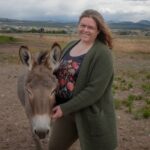
Burro Assisted Services: The Values and Disadvantages of Working with Non-Domesticated Animals in an EAS Setting: Room C
Information
Date & Time
-
-
Location
-
Cleveland State University Student Center
2121 Euclid Avenue
Cleveland, OH 44115
Learning Objectives
Participants will be able to:
-
Compare and contrast the inherent behavioral differences seen in less-domesticated versus domesticated equines, noting at least similarities and at least 2 differences.
-
Explain how terminology across industries can affect participant interaction with and perception of equine workers.
-
Identify 3 values of bringing less-domesticated equines and animals into a social work practice.
Educational Goal
The educational goal of this workshop is for attendees to increase knowledge of the incorporation of mustangs and burros into social work settings.
Description
In this workshop, we will explore the value and difficulties in working with a less-domesticated herd within the context of Equine Assisted Services. We’ll discuss the importance of language and terminology within a mental health context, creating safety and choice within a traumatized population (of animals and people), and practical applications of working with and learning from animals that have lived without human interference at some point.
Target Audience
- Counselor
- Marriage & Family Therapist
- Psychologist
- Social Worker
- Veterinarian
Presenters

Kali Fernandes is a U.S. Army veteran who holds a bachelor’s degree in psychology with a focus on the Human-Animal Bond. She has been mentored in the Equine Assisted Services field for the past 12 years, working closely with industry leaders to discuss, improve and advance the field as a whole. Kali recently became a certified Equine Facilitated Learning practitioner through The HERD Institute and is currently acting as the Program Manager for the non-profit organization Interdependence Assisted.

Caitlin Budde holds a Masters Degree in Clinical Social Work and she has been serving children, adults, and families in Helena, Montana since 2012. She also had an instrumental role in one of Montana’s largest residential group homes starting therapeutic retreats for families. She has facilitated Psychotherapy Assisted by Equines and Equine Facilitated Learning for several organizations and later in private practice. Cait has been riding, working with, and learning to care for horses since first falling in love with an Arabian named Bai when she was 12. Cait currently serves as the Clinical Director for non-profit Interdependence Assisted.
Financially Sponsored By
- International Association of Veterinary Social Work